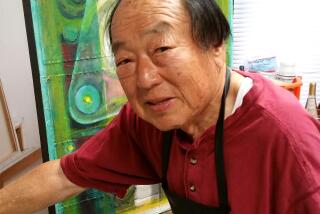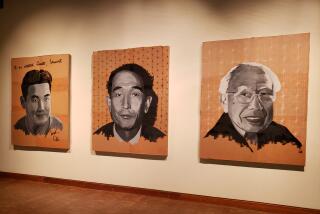Brain Surgery Blurs Future of Sony Chairman : Japan: Analysts speculate that his absence could trigger executive changes at giant electronic company.
- Share via
TOKYO — Akio Morita, chairman of Sony Corp.--the parent of Culver City-based Sony Pictures Entertainment--has been hospitalized with a cerebral hemorrhage, sidelining at least temporarily an influential proponent of improved U.S.-Japan relations and changing Japanese corporate management.
Sony executive deputy president Tsunao Hashimoto said Thursday that Morita, 72, had undergone a successful operation and would not necessarily have to retire from his post. It is unclear, however, how fully or rapidly Morita may recover.
“The doctors said the operation was successful, but we will need time to know the full outcome,” Hashimoto said. “He is able to respond to calls from doctors and family members.” Morita was still unable to speak but could squeeze a doctor’s hand, he said.
Morita turned over daily operation of Sony to President Norio Ohga in 1989. Some analysts said his absence may trigger some executive changes at Sony--despite company statements to the contrary--but few said the illness would have a major impact on the company.
Morita, who co-founded Sony’s predecessor company just after World War II and engineered Sony’s worldwide fame, is perhaps Japan’s best internationally known businessman.
Morita is a co-chairman of the private Japan-U.S. Business Council, dedicated to improved business relations between the two countries, and is a vice chairman of Keidanren, Japan’s largest business organization. He had been the likeliest candidate to be the next Keidanren chairman, but apparently will no longer be able to accept that post.
Ohga earlier told reporters that Morita would not be able to participate in his wide-ranging activities outside of Sony.
Koichiro Chiwata, an electronics industry analyst at Salomon Brothers Asia Ltd., said Morita’s illness was a loss for Keidanren, because had he become its chairman, he “would have given much more international color to Keidanren than anybody else.”
Asahi Shimbun, a leading Japanese newspaper, said in today’s editions that Morita’s hospitalization is a great loss not only for Japan-U.S. relations, but is also a blow to Japan’s business world in general. The newspaper noted that Morita has strong opinions about how to improve Japanese management through such means as raising employees’ salaries and paying higher dividends to stockholders.
Morita was hospitalized Tuesday in Tokyo after he complained of dizzy spells while playing tennis.
He was found to have suffered a cerebral hemorrhage in the right side of his brain, Hashimoto said. Morita underwent a four-hour operation to remove an egg-sized clot of blood from his brain.
Hashimoto said the delay in announcing the illness was to allow time to know whether the operation had been a success.
Hashimoto said Sony’s management will not require any major changes as a result of Morita’s illness because of the earlier transfer of chief executive duties to Ohga.
Morita and a fellow engineer founded Tokyo Telecommunications Engineering Corp. in 1946, working out of a bombed-out Tokyo department store. The firm became Sony Corp. in 1958. Morita led it to international prominence as a maker of transistor radios, videotape recorders and the Walkman (personal, portable sound systems).
He co-wrote, with conservative parliamentarian Shintaro Ishihara, a controversial 1989 best-seller, “The Japan That Can Say No,” which contained sharp criticism of both Japan and the United States. But in the work, Morita also declared that the two countries have a relationship of “inescapable interdependence.”
In 1989, Morita led Sony in making a $3.4-billion-plus sizable debt purchase of Columbia Pictures, an ambitious, controversial move. This came two years after Sony bought CBS Records, another American entertainment giant.
Shortly after announcing plans to buy Columbia, Sony became embroiled in a bitter dispute with Warner Communications, which held under contract two producers that Sony wanted to hire to run the studio. Sony eventually got the executives, Peter Guber and Jon Peters, but paid a steep price.
Over the past two years, Sony, which depends heavily on exports, has been hit hard by the rapid appreciation of the yen, and its profits have fallen sharply.
Five Decades at Sony
Akio Morita’s 47 years at Sony Corp:
* 1946: At the age of 25, co-founded Tokyo Telecommunications Engineering Corp, which becomes Sony Corp. in 1958.
* 1971-1976: President of Sony Corp.
* 1976: Named chairman; credited as the principal driving force behind Sony’s innovative products.
* 1986: Authored “Made in Japan,” an autobiography that criticized short-sighted American business practices, which he claimed helped Japan’s worldwide industrial supremacy.
* 1987: Initiated the purchase of CBS Records for $2 billion.
* 1989: Bought Columbia Pictures for $3.4 billion and co-authored with Shintano Ishihara “The Japan That Can Say No,” a bestseller that drew accusations of America-bashing.
* 1989: Relinquished presidency and daily operations of Sony.
* 1993: Named chairman of U.S.-Japan Business Council.
Sources: Wire reports; Forbes
Researched by ADAM S. BAUMAN / Los Angeles Times
More to Read
The biggest entertainment stories
Get our big stories about Hollywood, film, television, music, arts, culture and more right in your inbox as soon as they publish.
You may occasionally receive promotional content from the Los Angeles Times.










